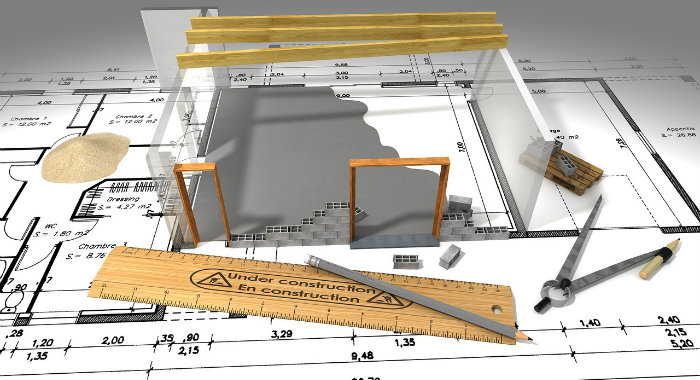Owners, managers and tenants of commercial premises and industrial property have a huge responsibility to look after the asset. To do so you need to understand commercial property surveys and reports.
A commercial survey differs from a residential survey in many ways. Not only is this specialist service highly specific to the client’s commercial requirements
Here are five important surveys that anyone involved with commercial property should be familiar with.
Building Survey
A building survey is important both if you want to buy a commercial property or if you are a tenant considering leasing one.
If you intend to purchase commercial property, commissioning a Building Survey is a must. The survey will provide a detailed report on the condition of the building. This will include highlighting any defects and advising of future maintenance and repair requirements.
The areas a commercial building survey will look at include:
- Checking construction and structure
- Checking for environmental hazards such as asbestos
- Assessing the overall condition of the building
- Checking legal documents
Like a residential building survey, a commercial one will ensure that you are fully aware of the condition of the property and don’t get a nasty surprise once you have signed on the dotted line.
Due to the nature of commercial leases, the terms of which often state that the tenant is liable for property repairs, a Building Survey is also key for a potential tenant.
It will help ascertain the detailed condition of the building and building elements. The report may also contain suggestions for remedial work. If such works have to be carried out by the tenant due to the lease agreements, it’s important the tenant is aware of the potential extra costs.
From the point of view of the tenant, it is crucial to understand the future repair liabilities which can impact the negotiations of the lease or freehold purchase.
As such, this is one of the most important surveys for commercial properties for any owner or tenant.
Dilapidations Survey
A commercial property lease will come with certain obligations that need to be complied with under the terms of the lease. As a tenant, you are expected to leave the property in the same condition as at the beginning of the lease.
Long-term tenants may be liable for extensive repair and refurbishment works as part of their dilapidations liability.
A Dilapidations Survey or Assessment is concerned with works to be carried out in the property to restore it to its previous condition. The document contains an explanation of what the tenant will need to have done, along with an estimate of likely costs.
Most commonly, the landlord will issue a Schedule of Dilapidations towards the end of the lease, which in effect acts as an assessment of the current condition of the property and a specification of the tenant’s repairing obligation.
If a tenant doesn’t agree with the Schedule, a Dilapidations Survey can also be used to prepare the tenant’s response and act as a basis for negotiation.
This is one of the commercial property surveys that is again useful for both the owner or the tenant of a commercial property.
Reinstatement Cost Assessment

Building insurance for commercial property is essential for obvious reasons. If the worst were to happen – fire, flood etc – and extensive repair or rebuilding work became necessary, your building insurance would cover it.
However, if the property was incorrectly valued, the existing level of insurance may be insufficient to cover the necessary building works. This would leave you out of pocket.
A Reinstatement Cost Assessment is designed to give you an accurate, up-to-date value of the property for insurance purposes.
Should the report identify that your commercial property is either underinsured or overinsured, you will have the information you need to make the appropriate changes with your insurer.
Asbestos Survey
Asbestos is a hazardous building material, the use of which was banned from construction in 1999. Unfortunately, asbestos is still present in many buildings built before that time.
Exposure to asbestos carries real risks for human health, particularly when airborne asbestos fibres are breathed in. Did you know that malignant mesothelioma, a type of lung cancer resulting from asbestos exposure, claims around 3,000 lives a year?
Many commercial property owners fail to understand the risks associated with asbestos exposure.
They also don’t realise
A commercial Asbestos Survey is carried out to identify any asbestos present and the degree of risk it carries.
The report will include recommendations for an effective asbestos management plan that you should draw up. Here’s some official HSE guidance on how to write an asbestos management plan.
Access Audit
An Access Audit on your commercial property is carried out to ensure that the building meets the accessibility needs of your staff, clients or site visitors.
The Equality Act of 2010 came into force as a replacement for the Disability Discrimination Acts of 1995 and 2005. The new Act covers a wide range of issues to protect people from discrimination, including transport to workplace issues.
If a disabled person is unable to gain access to the premises because suitable access provisions have not been put in place, this could be deemed discriminatory.
An Access Audit is an in-depth report that details all aspects of the building in order to identify any physical impairments that would prevent a disabled person from gaining full entry.
As part of the audit, you will be given professional guidance and advice on what (if anything) needs to be done to comply with the legislation.
Other Commercial Property Surveys To Consider

There are other surveys and reports that you might need if you want to buy or own commercial property. Here is a brief summary of those.
Due Diligent Report
This basic survey will tell you all about the deeds and history of the commercial building you are interested in buying or leasing. It will include a check of legal documents, leasing terms and any service charge agreements.
Disposal Survey
This type of survey is for owners of a commercial building that might be dilapidated. It can make the selling process smoother and quicker, by gathering all the information about the building that a potential buyer would need.
Condition Survey
If you want to buy a commercial building that hasn’t been empty for a while, you might want to get a condition survey done. This will assess the condition of the building and recommend any remedial work that would need to be carried out.
Understanding Various Surveys And Reports Can Save You Money
Like with any property purchase, it’s important that you know what you let yourself into. Given that the upfront cost of commercial properties is higher, it’s even more important to get all the relevant information you need.
Surveys and reports are the best way to get this information, as these surveys and assessments are carried out by professional surveyors.
Unlike a residential tenant, a commercial tenant tends to be responsible for maintenance and repairs on the building as part of the lease agreement. This means that if you are looking into leasing a commercial property, it’s vital that you understand what is involved.
And again, commercial property surveys and reports are the way to ensure you won’t be out of pocket down the line.




